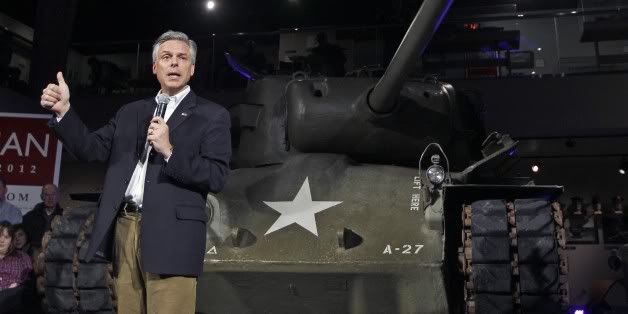American History
Related: About this forumCandidates Show Fondness for World War II References

Republican presidential candidate Jon Huntsman speaks in front of a tank at the Wright Museum, a World War II museum in Wolfeboro, N.H.
By Rebecca Kaplan
Updated: January 3, 2012 | 2:47 p.m.
January 3, 2012 | 1:18 p.m.
WEST DES MOINES, Iowa –- The Republican candidates for president frequently tell voters that this is the most important election of their lifetimes. For some of them, the contest is so important that it’s worth comparing to one of America’s most decisive moments: World War II.
Texas Gov. Rick Perry on Tuesday became the second candidate to compare his presidential bid to the great battles of the 1940s. He invoked the 1944 Allied invasion of German-occupied Normandy.
“It is a powerful moment in America’s history,” he told a group of about 200 volunteers assembled at the campaign’s informal headquarters in the West Des Moines Sheraton for a last-minute training session. “And you are on the front lines. This is Concord, this is Omaha Beach. This is going up the hill, realizing the battle is worth winning. This is about sacrifice.”
----------
http://www.nationaljournal.com/2012-presidential-campaign/candidates-show-fondness-for-world-war-ii-references-20120103
Hokey.
bemildred
(90,061 posts)Arbitrary power seems to still have great appeal.
ellisonz
(27,711 posts)You don't hear much about World War I or Vietnam...probably because we took major casualties in both and didn't exactly win per say. If I ever run for office I'm talking about the War of 1898 nonstop. "My opponent is a Weyler..." ![]()
Adsos Letter
(19,459 posts)I'm making an assumption that younger voters haven't lived with as much reference to WWII as older voters have.
Gotta' be careful with assumptions, though.
ellisonz
(27,711 posts)No one talks about WWI because there aren't really too many movies or video games - even "War Horse" is just kinda getting the WTF...
Few directors have tried to depict the 'Great War.' Steven Spielberg is the latest, though his 'War Horse' falls short of the rich, dramatic works by Jean Renoir, David Lean and others.
By Stephen Farber, Special to the Los Angeles Times
January 3, 2012
World War II has inspired far more movies than any other war, which is understandable, given the sharp demarcation between good and evil that characterized the battle against Hitler and his allies. By contrast, World War I is rarely depicted on the screen. It doesn't offer the same moral clarity as the fight against fascist tyranny. In one of the best World War I movies, Peter Weir's "Gallipoli," a hermit living in the Australian outback asks the young hero how the war started. "I don't know exactly," the eager recruit replies, "but it was the Germans' fault."
That muddled sense of purpose may explain why filmmakers have shied away from the Great War, as it was known before people dreamed there might be even more devastating conflagrations on the horizon.
Nevertheless, some great directors besides Weir — Jean Renoir, David Lean and Stanley Kubrick among them — have found rich, dramatic material on the battlefields of World War I. Now Steven Spielberg begs to be compared to those masters in his new opus, "War Horse." But he doesn't match their achievements. He doesn't seem nearly as comfortable in this terrain as he was when he directed "Schindler's List" and "Saving Private Ryan," two World War II movies for which he won Oscars. (Spielberg also helped to produce two acclaimed World War II miniseries for television, "Band of Brothers" and "The Pacific."
One reason for Spielberg's current failure may be found in his taste for easy emotional uplift. But another factor is undoubtedly the confusing moral landscape of World War I. The disappointment of "War Horse" becomes even more glaring if you look back at some of the landmark movies that did capture the chaos of the 20th century's first major war.
http://www.latimes.com/entertainment/news/movies/la-et-world-wari-movies-20120103,0,4725524.story
No one wants to talk about a war of trenches, but charging up the beaches of Normandy is "sexy" politics.
MicaelS
(8,747 posts)Is right in the LA Times Article you quote:
World War II has inspired far more movies than any other war, which is understandable, given the sharp demarcation between good and evil that characterized the battle against Hitler and his allies. By contrast, World War I is rarely depicted on the screen. It doesn't offer the same moral clarity as the fight against fascist tyranny.
But another factor is undoubtedly the confusing moral landscape of World War I.
WWII was as about as white / black as you can get. Germany and Japan wanted to conquer their respective parts of the world. The Allies wanted to stop them.
So in WWI we have in no particular order:
(1) Serbia wanted to smack up on Austro-Hungarian Empire.
(2) Austro-Hungarian Empire wanted to smack up on Serbia.
(3) The Kaiser had a serious case of penis envy of France and everything French.
(4) The Ottoman Empire wanted lot of money from someone.
(5) The French wanted Alsace and Lorraine back.
(6) Much of the British Cabinet wanted to stay neutral.
(7) The Russians wanted something, even they weren't sure what.
(8) All the major combatants believe they had been attacked and were fighting a defensive war.
(9) The US wanted to make a boatload of money selling arms.
Talk about "confusing moral landscape". Jeez.
ellisonz
(27,711 posts)I mean any conflict with North Korea or Iran isn't going to be fast moving like Iraq...it's going to be artillery slugging it out, with a contingent air battle, and wave attacks.